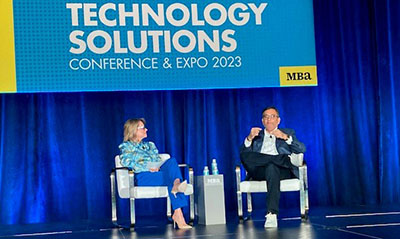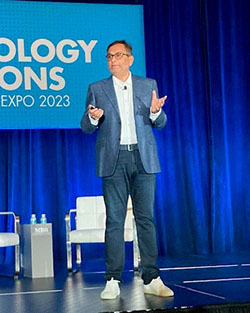
#MBATech23: Managing AI with the ‘Father of IBM Watson’

(MBA Vice Chair Laura Escobar (l) with Manoj Saxena Monday at #MBATech23 in San Jose, Calif.)
SAN JOSE, Calif.—Manoj Saxena, Chairman of AI Global, London, is perhaps best known as the “Father of IBM Watson,” the ubiquitous face of artificial intelligence. Now, his goal is to manage technology—and use AI as the business model of the future.
“I believe in the use of technology to create good for the world,” Saxena said here at the Mortgage Bankers Association’s Technology Solutions Conference & Expo. “AI is a fundamental technology that is going to change the human race.”
AI has transformed at a pace that Saxena said he did not anticipate. “It is already proving disruptive to business,” he said. “For example, we’re seeing ChatGPT being banned in some countries—people liken it to having a sports car without a steering wheel.”
AI is non-biological intelligence, Saxena said. “In the last 10 years, we’ve seen a proliferation of AI in every aspect of our lives—even our refrigerator and toaster.AI is progressing so rapidly, it is starting to outpace human knowledge itself.”
AI has three patterns of use: Automated AI, which replaces tasks; Augmented AI, which pairs humans and machines; and Autonomous AI, which replaces humans. “Of the three, I think Augmented AI is the most fascinating, because you can see how AI learns and adapts to human behavior and makes processes more intelligent,” Saxena said.

ChatGPT, a natural language tool driven by AI, has much more potential than the ability to have a human-like conversation with a chatbot, Saxena said. “You can write movies; you can create games; going forward, if you can type, you can generate code and write applications,” he said. “What you are going to see is that in a few years, everyone is going to have a chat-based application.”
While Saxena says he has “never been so excited about the potential of AI,” he is also concerned about its potential for harm. “ChatGPT has major limitations,” he said. “It has the ability to misinterpret data and create ‘model hallucinations.’ And it has no concept of regulatory compliance—it has no idea of how a regulation works in Illinois as opposed to Turkey.”
Cybersafety will become as important as cybersecurity. “You are going to have to prove that your model is not hallucinating and that you are making sound business decisions,” Saxena said.
For the mortgage industry, Saxena said, AI has the potential to improve every aspect of operations. But without trust, he said, “many AI projects will fail or cause massive unintended harm. You have to move the whole trust component to the beginning of the process…It has to have buy-in from the C-Suite and must be part of an integrated strategy. It’s not enough to simply hand it to your IT people and say, ‘make it work.’”
AI can be safely used, Saxena said, but it requires a two-stage adoption model: Educate and Align; and ‘Nail it, then Scale it:’
(Educate and Align)
–Educate yourself on its capabilities, limitations, harms, use cases
–Learn about underlying tech, e.g. LLM, Langchain, Prompt engineering
–Until then, ban free use by employes using company data or content
–Define and set up AI Safety framework and guardrails for compliance
–Build a use-case heatmap of Outcomes vs. Complexity vs. Workforce capacity
(Nail It then Scale It)
–Set up a “clean room environment” and bring in ChatGPT or similar models
–Ensure it cannot talk to the internet and scope a use case with clear metrics
–60-day projects with small budget so you “Pay for success” vs. “Pray for success.”
AI has tremendous potential, but in the next few years it will also cause significant disruption in business, democracy and warfare, Saxena said. “It’s a double-edged sword that needs regulation the way we regulate nuclear power,” he said. “If you thought the 2020 election was disruptive, wait until 2024.” Incredibly, Saxena said, humans will need to use AI—to control AI.
“Embrace AI—but embrace AI with responsibility and safety in mind,” he said.
